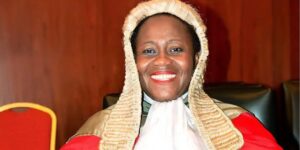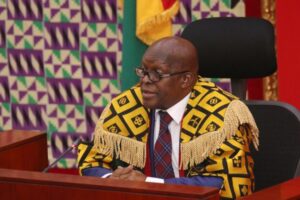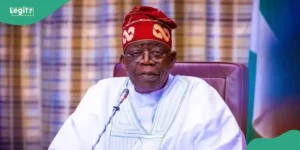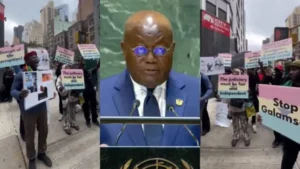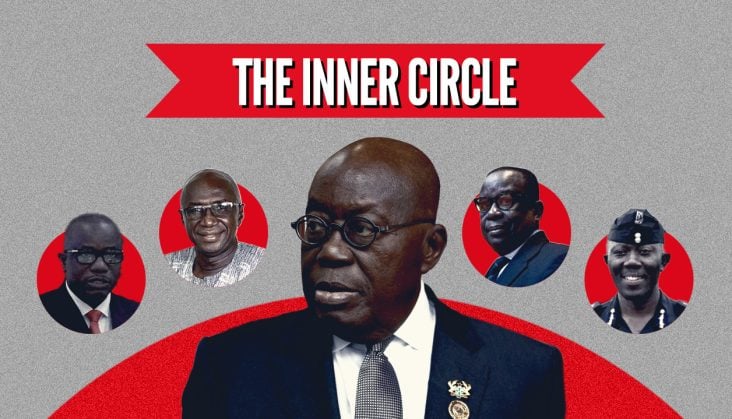
Source: The Africa Report
The Africa Report takes a look at the security leaders maintaining Ghana’s reputation as the oasis of peace in the troubled West Africa.
From a chartered accountant to researchers and lawyers, Ghana’s President Nana Akufo-Addo surrounds himself with unassuming personalities to protect the territorial integrity of the West African country.
Ghana has over the decades been described as the oasis of peace in the troubled region of West Africa, largely as a result of its political and security stability, earning itself investors and tourists from around the world.Â
Surrounded by Ivory Coast to the west, Togo to the east and Burkina Faso to the north, the gold- and oil-rich country has managed to remain unattractive to extremist groups, whose activities have shaken the security alertness of its neighbours.
Although armed terrorist groups continue to make significant inroads from the Sahel region to coastal West Africa, Ghana remains safe in a region plagued by political instability, despite pockets of potential threats around its borders, especially in the north, close to Burkina Faso.
Official records from the bloc ECOWAS say more than 1,800 terrorist attacks were recorded in the region in the first half of this year, resulting in 4,593 deaths in Burkina Faso, Mali, Niger and Nigeria.Â
The Africa Report examines the men who are on the watchtower, protecting the country of 31 million people from potential terrorist attacks.Â
Dominic Nitiwul hails from Bimbilla in the Northern Region of Ghana, where the majority constitutes the personnel of the Ghana Armed Forces. He is part of the inner circle of the president when it comes to making critical security decisions.
He has served as President Akufo-Addo’s defence minister since he assumed office in 2017. The 45-year-old became an MP at the age of 25 and has been a lawmaker for two decades. Between 2012 and 2016, when the New Patriotic Party (NPP) was in opposition, he served as the deputy minority leader in the Ghanaian Parliament.Â
Nitiwul studied conflict prevention and management in Germany and the UK. He also obtained his Master of Business Administration in finance from the University of South Wales, a B.ED from the University of Education, Winneba, and a Master of Laws in corporate finance from the University of Westminster.
Security experts say he was instrumental in keeping the morale of the army personnel high during his tenure.
Meanwhile, Vice Admiral Seth Amoama is the chief of the defence staff, who was enlisted into the Ghana Armed Forces as a Naval Cadet in 1981. Part of his training was done at the Pakistan Naval Academy and the Britannia Royal Naval College, Dartmouth, UK. He was also the best all-round graduate in his junior and senior courses at the Ghana Armed Forces Command and Staff College. He also graduated from the Nigerian Defence College in August 2013 as the best all-round graduate.Â
Amoama is an alumnus of the Galilee Institute of Management in Israel and holds a Master of Science Degree in Strategic Studies from the Political Science Department of the University of Ibadan, Nigeria. He once served at the UN headquarters as a military planning officer at the department of peacekeeping operations from February 2005 to May 2008. He also served as a UN military observer in Rwanda (1995-1996), UN liaison officer in Lebanon (1997-1998), and UN staff officer in Sierra Leone (2001-2002). Â
Ambrose Dery has been Ghana’s interior minister since 2017. He is also an MP on the ticket of the governing NPP in Nandom in the Upper West region. He has been instrumental in rolling out security measures with other agencies to secure public places, including religious gatherings, hotels, and malls in the West African country.
Dery is a graduate of the University of Ghana and a trained lawyer, who once served as a deputy Attorney General under President John Kufuor in 2003. He also served as a regional minister from 2005 to 2007. He has rich parliamentary experience and served as the leader of the Pan African Parliament’s Observer Mission to the Namibian Presidential and Parliamentary Elections in November 2009, and a leader of the Pan African Parliament fact-finding mission to Cote d’Ivoire.Â
George Akuffo Dampare, the youngest Inspector–General of Police to be appointed in the fourth republic and the eighth youngest since Ghana gained independence, has been described as the modern-day police chief best suited to transform the police service. He has been the police chief since October 2021 and has improved confidence in the service.
His tenure has seen an increase in police visibility in communities with the introduction of K9, horse and motorbike patrol teams. Dampare, who joined the service at age 20 and rose through the ranks, has centralised and equipped the Police Intelligence Department (PID), which primarily deals with violent crimes such as robberies and highway attacks. He has also set up a social media team that engages and picks signals of distress situations to ensure prompt response.Â
Serving as the national security chief since January 2017, Albert Kan-Dapaah has taken charge of the government’s fight against terrorism, launching a couple of initiatives including the widely publicised “See something, say something†campaign – a citizens’ awareness drive aimed at protecting the country against terrorist attacks.
The chartered accountant usually sports his trademark dark glasses in public. He has over three decades of political experience. Kan-Dapaah was a member of Ghana’s parliament from 1997 to 2013. He served as energy minister before being moved to the communications ministry, then to the interior ministry and finally, the defence ministry in the Kufuor administration in the noughties. Prior to these ministerial roles, he served on several parliamentary committees: employment, communications, defence, interior, and mines and energy.Â
Meanwhile, little is publicly known about Edward Asomani, who was serving in a deputy position before being elevated as the substantive national security coordinator on 5 August 2022. He is a political researcher and policy analyst, who once headed the Danquah Institute, the pro-policy think tank of the governing NPP.
He is an alumnus of the University of Oxford, the University of Manchester, Sheffield Hallam University, and the University of Ghana.Â
Quaicoe is the head of the National Intelligence Bureau (NIB), formerly the Bureau of National Intelligence (BNI). He once served as the boss of the governing party’s governance think tank the Danquah Institute. He has led teams on national surveys and research helping to formulate policies and messages for President Akufo-Addo.
In 2015, he was accused of playing a key role in bringing into the country ex-South African police officers to secretly train NPP private security ahead of the general polls. He was then invited by the same security outfit he is now heading and he denied the claims, saying one of them was only invited into Ghana to lecture on security issues.
Takyi heads the Ghana Immigration Service, mandated to protect the borders. He has been at the helm of affairs since Akufo-Addo came to office in 2017. Under his tenure, border patrol officers of the Ghana Immigration Service (GIS) have now been armed with guns and motorbikes to fight border crimes. He has been proactive in launching “Operation Conquest Fist†aimed at protecting Ghana’s territories along the boundaries with Burkina Faso, Cote d’Ivoire and Togo.
He is a trained lawyer and holds an M.A. in Governance and Leadership from the Ghanaian Institute of Management and Public Administration (GIMPA) as well as certificates in international migration law and conflict transformation. He is a sports enthusiast and has worked in various committees of the Ghana Football Association.
